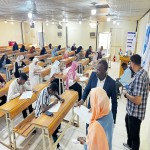1. Introduction and rationale
The
Bachelor of Science in administration sciences program is designed for students
seeking to acquire a high level of knowledge from a broad base of
administration concepts to create solutions to contemporary business problems.
It provides students with the pillars of a business education as well as
specialized options to propel them on their career paths. Hence, students will
acquire the skills needed to integrate business administration, marketing,
accounting, and banking and finance concepts through four years ( 8 semesters )
to develop strategies to improve short, medium, and long-term organizational
performance. The information sources of this curriculum are national , regional
,expert and international reports
The
Bachelor of Science in administration sciences provides a holistic approach to
exploring business by leveraging business courses as well as those required by
the college. Students are exposed to business and functional disciplines, the
increased interdependence of these disciplines, the larger role of business in
society, and essential skills such as teaming, career management, and critical
thinking.
The administration sciences program curriculum
constitutes the fundamental theories, principles, concepts, and skill sets
necessary for students to thrive in the professional business world. Each
required core course equips students with the knowledge and skills utilized in
key areas of business, while building upon their social, competitive, and
analytical intelligence. The business administration program also augments its
core curriculum with math, ethics, and economics.
As students advance, they declare an option
within the administration sciences program, or specialized functional
concentration, which presents a deep exploration of a specific functional area
in the study and practice of management. Students are provided with four
academic specialization options, including business administration, marketing,
accounting, as well as banking & finance. The specialized course offerings emphasize rigorous analysis of
the concepts and principles that are basic to an understanding of that specialized management field. This is beside course work
that relates theories and ideas to the operating practices and policies of
business organizations. These specializations provide
a unique opportunity for students to explore the workings of management and maintain a balance between the targets of economic success and the
limitations of increasing social and employment opportunities.
The Vision
Nahda International College is committed to developing itself to face up to the local and international challenges in the areas of
business studies through fostering engaged learning, scholarly and creative
work, community outreach, and student success in the job market.
The Mission:
Provide scientific and
practical knowledge in the fields of business studies, supply local and
external markets with highly skilled graduates in their respective fields,
building up their capacities to handle the changes while maintaining the
international university efficiency standards.
3. Curriculum goals:
3-1. Educational
goals:
·
Provide the students with the concepts of
administrative sciences field (business
administration-accounting-marketing-banking and finance).
·
Provide the students with the theories and principles
and schools of administrative sciences field.
·
Provide the students with the strategies of
administrative sciences field
·
Provide the students with skills of practicing the
administrative sciences in the industry
·
Provide the students with skills of problems solving
in the administrative sciences field.
3-2 Services
goals
·
Provide the community with skilled graduates in different areas of
business management capable of handling complex business problems.
·
Deliver services to the
community through scientific and practical consultancies and applied research
·
Offering top class education to prepare a generation capable of
dealing with modern technology and the digital revolution. .
·
Enhance the cultural ties and relations with the educational
institutions within and outside Sudan.
·
Activate collaborations and links with the public and private
sectors by developing the curricula of the college to match up with the
requirements of the job market.
3-3 Research
goals
·
Provide the students with the concepts of research
·
Provide the students with the skills of how to
determine the research problem
·
Provide the students with the skills of how to collect
the data
·
Provide the students with the skills of how to analyze
the data
·
Provide the students with the skills of how to solve
the problems and determine the findings and recommendations
4. Curriculum key principles:
The Bachelor of Business Administration Programme
employs a credit hour system, hence, it
is of 4-years duration, spread over 8 regular semesters, and consisting of 160 credit hours after completing of higher secondary
school certificate or equivalent.
5. Educational outcomes:
5.1 Graduate competencies:
The Bachelor of Business Administration Programme curriculum provides students with a
comprehensive management education of
globally recognized best practices with flexibility of their adaptation to indigenous entrepreneurial and
societal context. Curriculum of the programme
ascends from general management education to specialization in four business fields. General management skills
like oral and written communication,
decision-making, leadership, and teamwork developed among the students at the initial level of the programme
provides them with a solid foundation for
more advanced studies at the elective level during the subsequent stage.
Core courses taught integrate
information and theories from various disciplines, including communication, economics, financial accounting,
quantitative methods, business strategy,
marketing, finance, organizational structure and strategic management
and prepare the students to think critically
about business issues in order to enable them
to develop strategic level understanding and demonstrate comprehension of
complex theoretical constructs in the major
business disciplines and technologies.
Thus the main objective of the
program, is developing the unique leadership qualities among the students required for successfully
managing business functions, an organizational
unit or an enterprise. It aims to develop students into broadly educated business managers and executives who
understand the nature of business
as a whole, with the tools and techniques applicable to a wide variety of
business situations.
Upon completion of the programme,
many graduates go on to become successful entrepreneurs, or to assume
leadership positions in SMEs, major local and multinational corporations, in consulting
firms, or in government service.
In the field, the graduates are expected to
be able to integrate human and other organizational resources with continually developing
technology, while nurturing the entrepreneurial
spirit that has always been one of the key characteristics to successful businesses. They are expected to
adapt and apply complex business theories
as they build an understanding of evolving organizational realities that
require instant, skilful and ethical action as
they aim through rapidly changing circumstances.
They are also expected to be able to identify key ethical, global, and
social issues surrounding business related
choices and make decisions that balance
corporate values and socially responsible action.
5.2
Learning objectives/outcomes
Upon graduation the students are expected to:
·
Demonstrate knowledge of the strategic management
process and an ability to assess industry attractiveness and the competitive
environment.
·
Explain how effective leaders use their interpersonal
skills to promote change, communicate vision, provide a sense of direction, and
inspire employees.
·
Successfully utilize the tools and techniques of
managerial accounting to make decisions about both day-to-day operations and
long-term tactics and strategies.
·
Utilize the tools and methodologies needed to solve
marketing problems, including developing marketing plans and the use of various
marketing strategies..
·
Apply fundamental processes, theories, and methods to
business communication in the workplace and the overall writing initiative.
·
Demonstrate an understanding of computer applications
and proficiency with the managerial applications of Internet technology,
including the application of management principles to business-to-consumer,
business-to-business, and intrabusiness commercial ventures.
·
Identify and apply fundamental math concepts for
operations and problem solving, and apply basic statistical concepts and tools
in order to correctly interpret the results of statistical analyses.
·
Understand computer-based information systems and be able
to use end-user computing tools and infrastructures to apply and interpret
functional business knowledge.
·
Design organizations to make and implement specific business
decisions under given performance requirements.
·
Recognize the special opportunities and challenges presented by the
global business environment.
6. Educational Strategies and Methods:
The educational and learning methods used in this program
are mainly lectures, supplemented by other methods such as self-directed
learning, practical application, assignments, seminars, and discussion.
7. Curriculum structure and organization:
This curriculum implemented through four years ( 8 semesters) with honours degree (160 credit hours) with
specialization in business administration , accounting ,marketing and banking
& finance.


